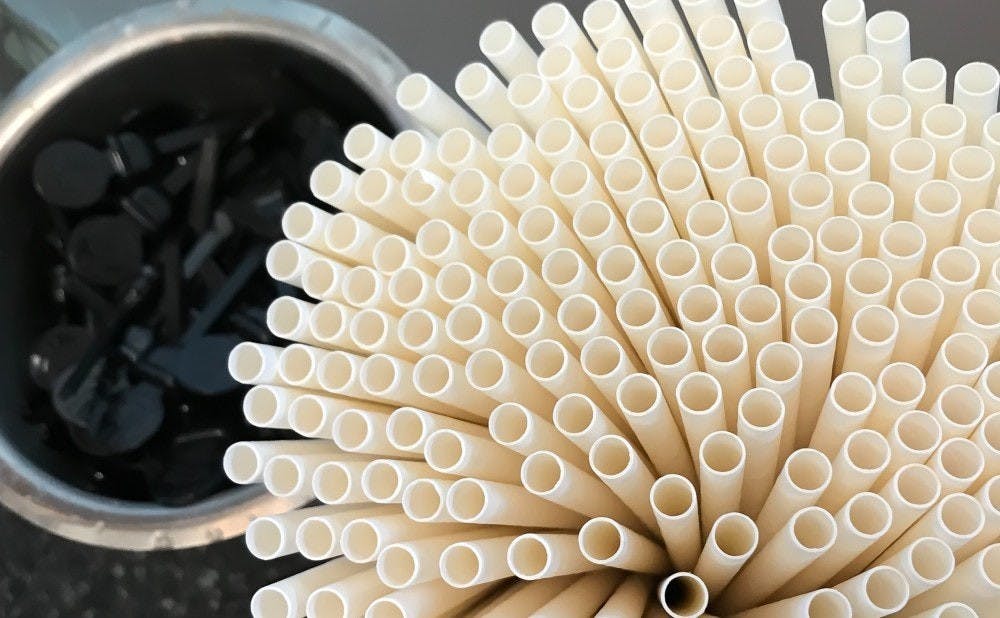On Oct. 2, Kanye West tweeted a photo of sautéed insects captioned, “My dad and I are going to eat this plate of bugs to celebrate him beating cancer. No more fear.” The picture was utterly horrifying.
No, it’s not the bugs that were disgusting. It was the plastic to-go box holding them.
Plastics undeniably pose a profound danger to our environment and ourselves. A conglomeration of hundreds of compounds, plastics are known to contain molecules that interrupt our hormones and cause cancer, in addition to housing numerous unstudied substances.
Thankfully, more and more organizations are trying to reduce our dependence on plastic, including our own campus. In July, Duke University slapped a campus-wide ban on disposable plastics, opting for containers made of compostable, plant-based material. And in September, Duke Student Government went further, approving a 25 cent “responsible diner fee” on disposable containers given out on campus, aimed at encouraging students to use a “reusable” to-go box instead.
By the start of the school year, vendors were using to-go boxes made of sugarcane fiber. We got disposable utensils labeled “Compostable,” made from a corn-based plastic called polylactic acid, or “PLA.” We are on track to receive our reusable to-go boxes next semester. It seems like great news for the environment all around, right?
Not so fast.
The manufacturer’s description of the PLA fork used on campus reveals that it is compostable in “commercial compost, but unfortunately not in your home compost.” This warning can be found on other PLA objects at Duke. Even the sugarcane boxes must be commercially composted in order to turn into soil.
Commercial composting involves mixing the plant-based containers and utensils with carbon, water, oxygen, and nitrogen. Bacteria also play an important role, munching down these plastics but only if the temperature is high enough—often as high as 160 degrees. This special environment of heat, gases, and microbes is impossible to find at landfills.
Turns out, Duke’s “eco-friendly” products are actually eco-friendly only if they find their way to a home with some very specific furniture. Unfortunately, the waste bins around Duke only take our trash to two facilities: landfill and recycling. Neither of these are equipped to compost our new “eco-friendly” garbage.
Disappointing, yes, but at least we can fall back on Duke’s new 25 cent tax on to-go boxes, right? The fee should deter people from using disposable products in the first place, right?
Sadly, this too is a bit more complicated than it seems. The reusable to-go container may not be as environmentally friendly as intended. A Danish study found that reusable cotton bags would need to be used 7,100 times just to match the carbon footprint of single-use plastic bag! Making a single-use plastic bag requires far less energy and produces far lower carbon dioxide emissions. So while Duke’s reusable container option may at first seem like an obviously better alternative to single-use containers, it’s not necessarily so.
Moreover, the new fee is what economists call a “regressive tax”: it’s hardest on the people who have the least money. On a campus where 51 percent of the student population is on financial aid, that’s a big problem. As students, we will now pay even more to eat with utensils that will fail just as miserably as what we were using before—annoying for everyone, but a major burden for those whose families are cash-strapped. And indefensible when an actual potential solution is staring us in the face.
Even Kanye tweeted about the damage plastics can do before mysteriously deleting his Twitter account several days later. We know the dangers as well. But we have to make sure that what we choose “solutions” that work, rather than theatrical gestures that will solve nothing while financially burdening the less well-to-do.
I am not the first to perceive something fundamentally incomplete about how Duke is approaching eco-friendliness. And unless we do better, I won’t be the last, either.
James Hwang is a Trinity senior.
Get The Chronicle straight to your inbox
Signup for our weekly newsletter. Cancel at any time.

